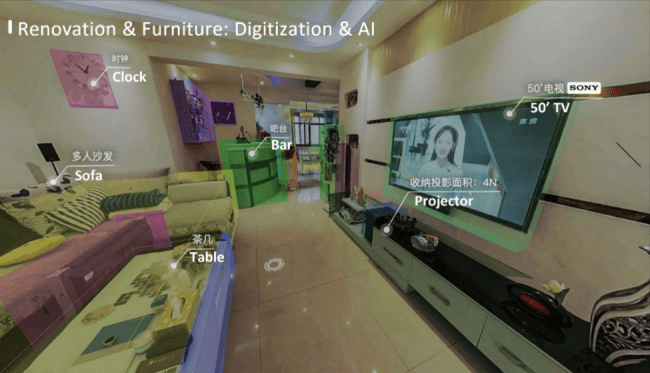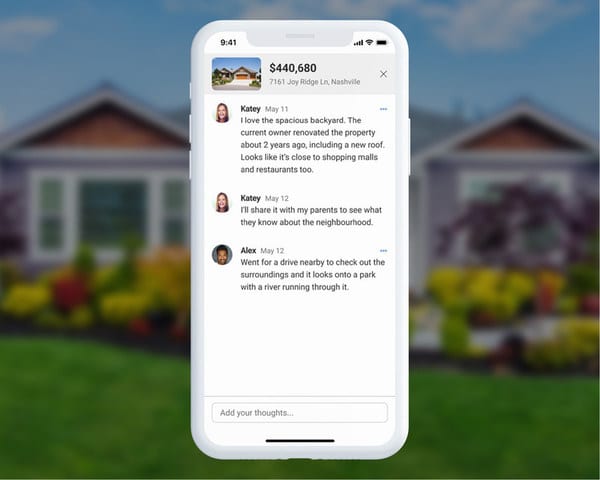
At OnlineMarketplaces we get sent a lot of press releases around new portal products and, if we're being honest, sometimes they just aren't that interesting or innovative.
It tends to be the property portal products that we find while researching other things that grab our attention. These seven tools and products have all flown under the radar to some extent and, in our opinion, all address real issues in their markets.
Virtual tours are all the rage in real estate at the moment. The only portal company in the West that has dabbled in proprietary tech in the space however is Zillow. While we like Zillow's 3d offering - agents can simply download an app for free, use their phone to take images that create the tour and then upload to Zillow and other major portals - there is a product in China which is next level.
Leading Chinese portal / brokerage / transaction platform Beike has developed proprietary technology with both national and international patents. Realsee is a product that produces digital maps, 3d tours and panoramic images - basically, everything that Matterport and the others do but perhaps with more important implications.
According to the company's Realsee presentation, VR leads have, amazingly, surpassed phone leads for the company as China embraces the technology. Obviously, engagement metrics are much higher and with the primary real estate market cooling, the VR tech plays into Beike's shift towards home renovation and decoration allowing users to visualise what their homes would look like with new furniture or a kitchen makeover.

The tech was first developed as a VR lab back in 2015 and really exploded in popularity in 2018 with the launch of ke.com with company sources saying that 70% of all listings (85%+ in tier one cities) are captured using VR and that Realsee already has well over 15 million buildings captured on the platform.
It's a pretty staggering number, especially when you consider that Matterport was reporting around 5 million buildings in its library in May, and it likely makes Beike's product the most used 3d PropTech in the world.
The company is on record as wanting to get into all purchases made within the home and the VR technology is a big part of that particular moonshot.
Okay, so Cian is not the first property marketplace that has gone down this route. This product does stand out however because of how complete it is and because of a specific problem in the Russian rentals market that it addresses.
Basically, Cian take care of almost everything with this product. They market the property with a special visibility package on the portal they then make the prospective tenant fill in a questionnaire that goes out to the landlord to accept or reject. They then take care of the documentation online, provide insurance and handle payments which they guarantee. They also waive the agency and the deposit which is super attractive to tenants.
Apparently in Russia, because of the restrictive bureaucracy involved, there is a lot of illegal apartment renting going on. This product allows the landlord to get the same income they would generate renting illegally because Cian charges the tenant an extra 4% while charging the landlord 990 Rubles. Everything is then above board.
Sometimes the best ideas are the simplest and this one certainly is simple. Having been around since 2015, Magicbricks' buy vs rent calculator tool was hidden from those of us in Europe until recently by the portal's GDPR concerns.
The tool does exactly what the name suggests. A user wishing to know whether it is in their long-term interests to buy or to rent a property feeds in details around the price, years to possession (in the case of new builds), expected appreciation and their current salary... and voilà, the tool tells them whether they are better off renting or buying.
There are a lot of things to consider when purchasing a house, especially in a market where off-plan purchasing is quite common. The calculator isn't a lead generator that makes users put in their email address and there doesn't appear to be an agenda to it other than simple, binary advice.
Have they cracked it?! Is ImmoScout24 the first property portal company to finally break the code of how to generate a significant recurring revenue stream from users rather than agents? It's true that the company is throwing a lot of marketing money behind these products, but the signs are looking good and there will be more than a few other portals around the world following these products closely.
The 'Plus' suite of products are consumer subscription products MieterPlus (renter), KauferPlus (buyer) and VermieterPlus (landlords).
The most popular of these is MieterPlus which costs between €30 and €10 per month depending on the plan and allows users to be top of landlords' inboxes, sign everything online and get free tenant proof of income assessment. Subscribers also get locksmith insurance and discounts on things like tenant insurance, storage and moving boxes.
According to Scout24's latest quarterly report, it had 236,612 consumer subscriptions with the products making up around 14% of Scout24's revenue (up from 12% in the corresponding period in 2020 and 9% in 2019). The products are a key part of the company's revenue diversification and growth strategy.
It is truly amazing the range of tools that can be built by a team with tons of experience and nice, standardised MLS data. When we interviewed American portal and agent software tool company Homesnap last month we were blown away by the range of tools they showed us.
We could just have easily selected Sell Speed (which uses AI to calculate how long a listing will take to sell at a given price) Concierge (which pre-qualifies Google and Facebook leads) or any of the myriad of other tools that Homesnap showed us. The one that really caught our readers' attention though was Likelihood to List.
The tool uses AI to predict how likely any particular home is to come on the market. With many portal companies around the world increasingly turning their attention to seller mandate leads, we imagine that there are more than a few over the pond in Europe wishing they had something similar to attract and retain agent customers.
After a gestation period of over a year, British challenger Boomin launched in April 2021 to a lot of industry scepticism. The challenger portal's USP was a host of user and agent-friendly tools that would make the difference. Since then a few other British portals have brought out a number of similar tools to those of their upstart rival which means Boomin must at least be doing something right.
ChainMaker has been developed by Boomin's in-house tech team and works by letting potential buyers register interest in properties that are already sold subject to contract, the agent would then have a list of potential buyers ready to step in should the original buyer drop out.
Boomin claims that 32% of all property transactions in the UK fall through because of a buyer pulling out somewhere in the chain. If the tool works and word spreads among the agent community, Boomin could use the momentum to sign up more agents to longer-term paying contracts.
Brokerage site Redfin has had collaboration tools on its mobile app since 2015 and Zillow brought out something similar in 2016 but, as far as we can tell, no portal site has gone as far as Realtor.com with their latest collaborative search functionality.
Users of the Realtor.com mobile app can now collaborate in their home search with friends and family and actually send opinion requests to people listed as "co-buyers" within the app which then stores the feedback related to each listing.

A bit of a head-scratcher as to why this wasn't done earlier. According to Realtor.com's research, 79% of people search for a home with someone else and 44% regularly text listings back and forth - why not bring all of that into one place where you have all the listing information there at a glance.